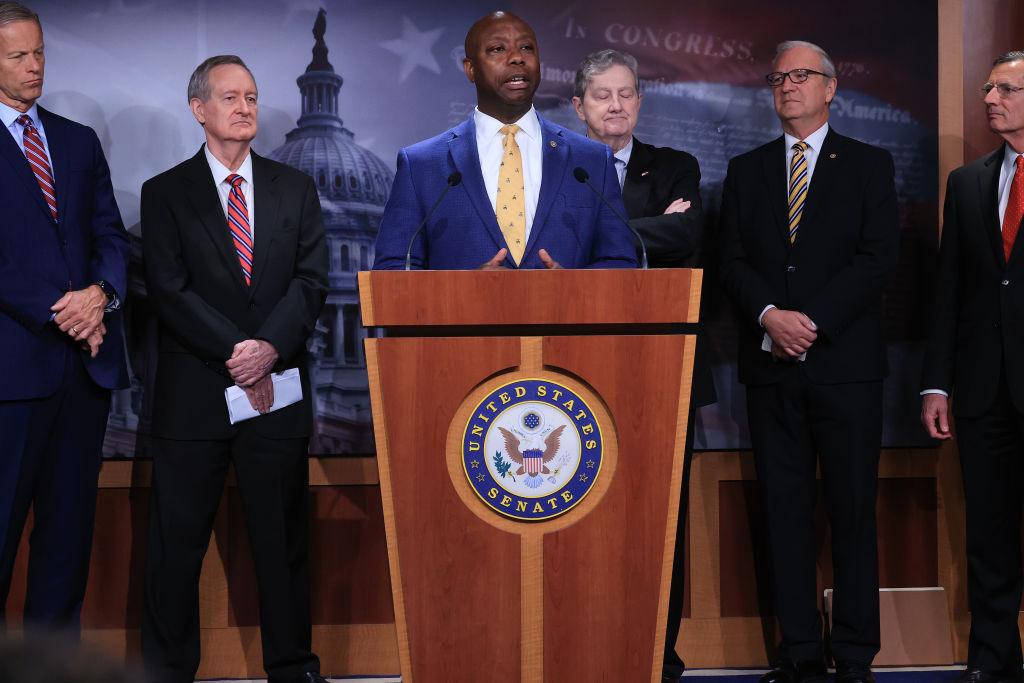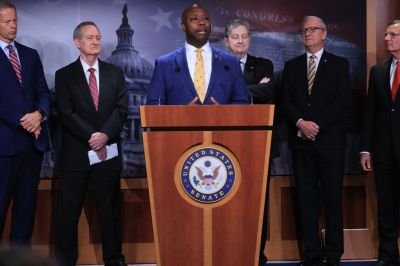Everybody loves Tim Scott. The senator was reelected in South Carolina last year by a resounding 26 percentage points, and he consistently scores among the most likable in the GOP presidential primary field.
In this week’s Iowa Poll, for example, his net favorability rating among likely caucusgoers was +38 percent, better than Donald Trump’s +35 percent, Nikki Haley’s +30 percent, and Vivek Ramaswamy’s +6 percent. His job over the next 75 days, according to the senator’s campaign, is to convince Iowa voters who like him that they should also caucus for him. He’s got a lot of ground to make up, though, currently trailing Trump by an average of 43 points in the Hawkeye State.
As well-liked as Scott is in Iowa, he’s arguably even more popular in the Senate. In conversations with The Dispatch this week, a number of his Republican colleagues there were effusive in their praise of the 58-year-old South Carolinian. To Sen. Ted Cruz of Texas, Scott is “a great guy and a good friend.” To Sen. Rick Scott of Florida, he’s “a smart guy.” Sen. Tommy Tuberville of Alabama labeled Scott “a good guy,” and Sen. Pete Ricketts of Nebraska thinks he’s “a great guy.”
But while GOP senators love him, many are beginning—gently, with plenty of love—to suggest that Scott’s path to the White House isn’t viable, as Trump continues to dominate polls and Haley, his fellow South Carolinian, appears ascendant in Iowa.
“I think he comes from a good place. He’s got great conservative values,” Sen. Mike Braun of Indiana told The Dispatch on Tuesday. “But I think he’s up against a juggernaut in Trump. For any of them that are wanting to think about how they overcome that, I don’t see how that works.”
Some of Scott’s colleagues were more delicate with their counsel. “It’s challenging for anybody,” said Sen. Shelley Moore Capito of West Virginia. “But he’ll know when the time is right.”
Sen. Mitt Romney of Utah, the Republican presidential nominee in 2012, was fresh out of advice for Scott on Tuesday. When asked by The Dispatch what he would tell Scott to do to improve his position in Iowa, Romney climbed into an elevator, opened his mouth as if preparing to respond, and then shrugged his shoulders as the doors closed.
Scott is heading back to Iowa this week for a series of town halls and roundtables, hoping to jump-start his struggling campaign. Because Iowa’s Republican base is particularly socially conservative and made up of lots of evangelical Christians, Scott’s campaign viewed the state as one he could corner in a competitive field. He has spent a great deal of time in the Hawkeye State, heading there immediately after launching his campaign in South Carolina in May and making dozens of campaign stops in Iowa since. And on Monday, the senator told radio host Hugh Hewitt that he was “Iowa or bust.”
It’s not looking good for Scott. Only 7 percent of respondents in this week’s Iowa Poll—the gold standard survey of likely caucusgoers from veteran pollster Ann Selzer—listed him as their first choice, putting Scott in fourth place behind Trump, Haley, and Gov. Ron DeSantis. That’s actually a drop of 2 points for Scott since August, while Haley has surged 10 points into a tie with DeSantis for second place.
Scott isn’t faring any better elsewhere. He’s polling a distant sixth place in New Hampshire, and fourth place in his home state of South Carolina. Nationally, the RealClearPolitics average has him at an abysmal 1.6 percent support.
“I’d be hard pressed to give Tim Scott any advice really,” said Sen. Kevin Cramer of North Dakota when asked what he would recommend his friend and fellow senator do to improve in Iowa. “If he asked me this question at the beginning of all this, I’d say, ‘Get accustomed to eating a lot of fried stuff on a stick. Spend a lot of time at the Iowa fair, and eat everything with a smile.’”
But what would Cramer tell his colleague now? “I personally don’t see a path for anybody that’s not Donald Trump,” he said matter-of-factly. Scott’s campaign declined to provide a comment to The Dispatch before this story’s publication.
The old Washington saw that “every senator looks in the mirror and sees a president” has been operative in most recent presidential cycles. Four years ago, seven sitting senators ran for the Democratic nomination, and Joe Biden, a longtime senator himself, eventually won it. In 2016, four sitting Republican senators threw their hats in the ring. This time, Scott is the only member of the world’s greatest deliberative body to jump in the race. Given the goodwill he has from his colleagues, Scott might have expected a bunch of Republican senators to get behind their own “favorite son” in the primary. But so far, just two sitting senators—John Thune and Mike Rounds, both of South Dakota—have actually endorsed him.
And the uncomfortable truth is that Scott’s stellar reputation in the Senate isn’t translating into support with Republican voters, either, no matter how often people like Sen. Lindsey Graham insist, as he did Tuesday, that his fellow South Carolinian is “doing a great job.” (Should Scott stay in the race? “As long as he wants to,” Graham retorted.)
For the time being, Scott’s long-term viability is reliant on his cash advantage. While his fundraising in the third quarter of 2023 slowed down—$4.6 million compared to 5.9 million in the second quarter—and his $12.4 million in expenditures revealed an alarming burn rate, Scott still reported more than $13 million in cash on hand. That’s better than both the $5 million reported by DeSantis and $9.1 million by Haley.
But any of Scott’s positive metrics pale in comparison to Trump, who continues to appear insurmountable for any of the challengers. A number of Republican senators this week acknowledged that reality while otherwise wishing Scott the best. One of them was Tuberville, who said he often worked out alongside Scott in the Senate gym before Scott launched his bid. Tuberville told The Dispatch he believes Scott would “make a good leader for our country.”
“I’ve told him, I said, ‘I’d vote for you, if President Trump wasn’t running,’” Tuberville added. And how did Tuberville’s genial gym buddy reply? “He laughed.”






Please note that we at The Dispatch hold ourselves, our work, and our commenters to a higher standard than other places on the internet. We welcome comments that foster genuine debate or discussion—including comments critical of us or our work—but responses that include ad hominem attacks on fellow Dispatch members or are intended to stoke fear and anger may be moderated.
With your membership, you only have the ability to comment on The Morning Dispatch articles. Consider upgrading to join the conversation everywhere.